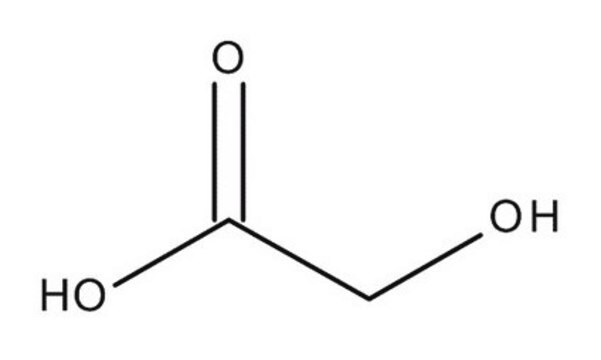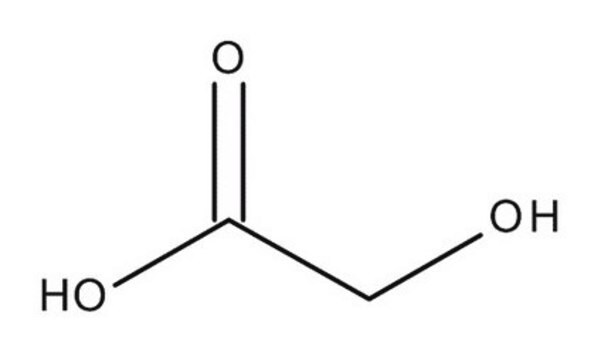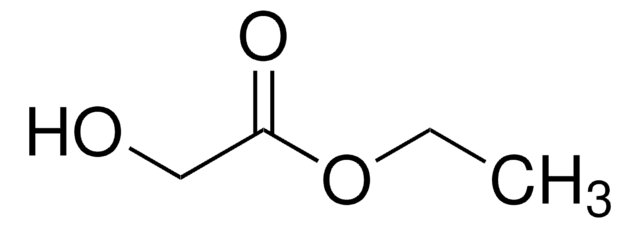12-1300
Glycolic acid solution
CP, 70% in H2O
Synonym(s):
Hydroxyacetic acid
Sign Into View Organizational & Contract Pricing
All Photos(1)
About This Item
Linear Formula:
HOCH2COOH
CAS Number:
Molecular Weight:
76.05
Beilstein/REAXYS Number:
1209322
MDL number:
UNSPSC Code:
12352106
PubChem Substance ID:
Recommended Products
grade
CP
form
liquid
availability
available only in Japan
concentration
70% in H2O
SMILES string
OCC(O)=O
InChI
1S/C2H4O3/c3-1-2(4)5/h3H,1H2,(H,4,5)
InChI key
AEMRFAOFKBGASW-UHFFFAOYSA-N
Looking for similar products? Visit Product Comparison Guide
signalword
Danger
hcodes
Hazard Classifications
Skin Corr. 1B
Storage Class
8A - Combustible corrosive hazardous materials
wgk_germany
WGK 3
flash_point_f
Not applicable
flash_point_c
Not applicable
Choose from one of the most recent versions:
Certificates of Analysis (COA)
Lot/Batch Number
Don't see the Right Version?
If you require a particular version, you can look up a specific certificate by the Lot or Batch number.
Already Own This Product?
Find documentation for the products that you have recently purchased in the Document Library.
E P Leumann et al.
Pediatric nephrology (Berlin, Germany), 4(5), 493-497 (1990-09-01)
The molar ratios of oxalate and glycolate over creatinine were determined in single urine samples of 26 infants and 27 children aged 1-5 years. In 135 children aged 5-16 years, two urine specimens were collected, one before breakfast and one
Genqiang Zhang et al.
Advanced materials (Deerfield Beach, Fla.), 24(34), 4609-4613 (2012-06-26)
Novel ZnMn(2)O(4) ball-in-ball hollow microspheres are fabricated by a facile two-step method involving the solution synthesis of ZnMn-glycolate hollow microspheres and subsequent thermal annealing in air. When evaluated as an anode material for lithium-ion batteries, these ZnMn(2)O(4) ball-in-ball hollow microspheres
D Jacobsen et al.
The American journal of medicine, 84(1), 145-152 (1988-01-01)
Ethylene glycol and glycolate kinetics were studied in two cases of ethylene glycol intoxication with maximal ethylene glycol/glycolate concentrations of 40.9/26.8 and 56.4/22.4 mmol/liter, respectively. Both patients survived, but with prolonged renal failure, upon treatment with bicarbonate, ethanol, and hemodialysis.
Thea R Pick et al.
Proceedings of the National Academy of Sciences of the United States of America, 110(8), 3185-3190 (2013-02-06)
Photorespiratory carbon flux reaches up to a third of photosynthetic flux, thus contributes massively to the global carbon cycle. The pathway recycles glycolate-2-phosphate, the most abundant byproduct of RubisCO reactions. This oxygenation reaction of RubisCO and subsequent photorespiration significantly limit
W H Porter et al.
Journal of toxicology. Clinical toxicology, 39(6), 607-615 (2002-01-05)
To correlate serum glycolic acid levels with clinical severity and outcome in ethylene glycol poisoning and to determine if glycolic acid levels are predictive of renal failure and the need for hemodialysis. We measured serum ethylene glycol and glycolic acid
Our team of scientists has experience in all areas of research including Life Science, Material Science, Chemical Synthesis, Chromatography, Analytical and many others.
Contact Technical Service







